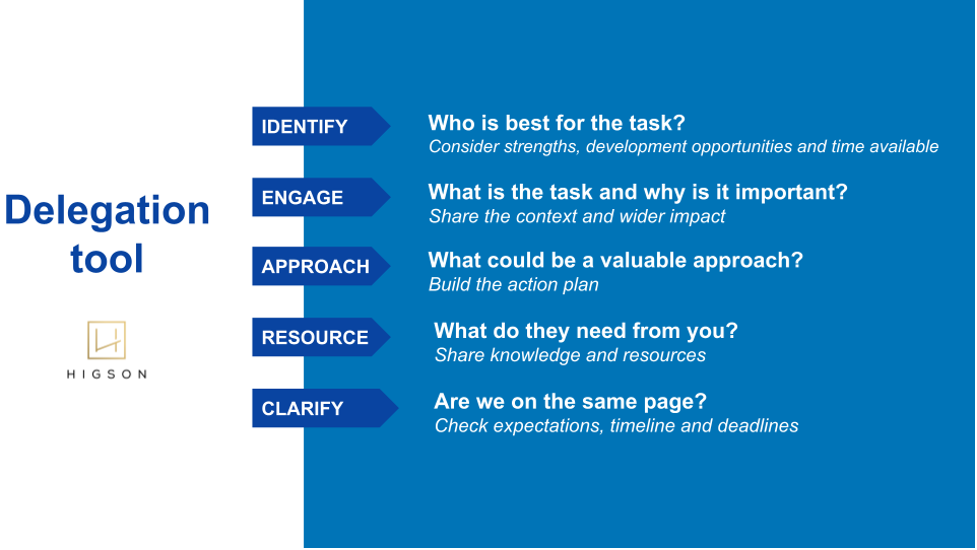18th December, 2019 • 3 min

Written by Augusta Vivian
6th October, 2022 • 4 min

Having an excellent delegation process is powerful. Both for leaders and their teams. For leaders, delegating a task from their proverbial ‘plate’ could make space for critical strategic thinking time. For team members, it can be motivating recognition and an opportunity for personal growth.
Despite this, we can hold back from delegating – even with a litany of tasks that are only getting longer. Why? To boil it down, it usually comes down to our mindset around time, trust, and guilt.
What stops us from delegating and why should we challenge ourselves?
1. Time
Have you ever found yourself thinking: “It will take time to explain this… time to check it over… it would be quicker just to do it myself”?
And yes, perhaps this is true the first time.
Ask yourself: Are you thinking about the long term?
The upfront time investment now could be a very sound investment for the future. Your team will be able to take ownership of this task and free you up for other activities such as strategic thinking, or working on your own goals.
2. Trust
Another reason we don’t delegate is because we don’t trust that the work will be done to the same standard as we could do it. We might think: “This is a really important project, I don’t want to risk it going wrong. To be honest, I may just have to re-do it anyway…”
With this, ask yourself two questions:
a) What is the worst thing that could happen if the quality is lower at first?
b) How will the team ever learn if they don’t try?
Yes, perhaps the first time they do the task it is not to your standard. However, if you delegate the task to them clearly, and with your guidance along the way, perhaps by the third, fourth or tenth time they could be as skilled as you are. Or, perhaps… even better!
If we give our team stretch tasks, and support their growth through them, it can be highly motivating. LinkedIn research has found that an individual is 94% more likely to stay at a company if they are learning.
3. Guilt
We may not delegate because we are thinking, “I know how busy and stretched they are already, I don’t want to add to their workload” or “I don’t want them to think I am handing down tasks that I think are beneath me.”
Ask yourself: Can you frame the task with purpose so they feel motivated and inspired by the extra responsibility?
If we take time and care with how we delegate, we can use it to motivate. Instead of it feeling like a burden to carry, it is a motivating opportunity. Being given extra responsibility is a huge piece of recognition.
This being said, of course there will be tasks we must delegate that no matter how we frame them the team may not enjoy or feel motivated by – things that even the most dedicated might roll their eyes to. You will know what they are in your team!
Connecting these tasks with your team’s wider purpose can help make even these more palatable. NASA ,famously gave meaning to the everyday, repetitive tasks of janitors in the 1960s – instead of “mopping floors”, they were “helping send a human to the moon.”
So what is the best approach for delegating?
It is not just about delegating more – how you delegate is crucial.
A clear approach can help resolve inward concerns about time, trust and guilt. This simple, five stage process helps us focus on how to delegate with clarity and leave our team members feeling supported and motivated.

1. Identify
Who is best for the task?
Be really intentional about this. nnWho in the team has the most time to work on this task at the moment? What are the development opportunities? Who could this be a great growth opportunity for?
We can end up getting into habits where we delegate certain tasks to the same individuals for stretch projects or operational tasks. Mix it up to spread out the development opportunities across the team.
2. Engage
What is the task and why is it important?
Take the opportunity to motivate whilst delegating by sharing how it ties to the big picture. This is a crucial part of delegating that we too often miss. As Simon Sinek shares in Start With Why, people are motivated by understanding the greater purpose.
So share with your team member: what is the purpose of this task? Why is it important? How does it link to the wider team success, strategy, goals? On an individual level, how does it advance their professional and personal development?
3. Approach
What could be a valuable approach?
Build the action plan together. You could coach them by asking them to share what they think is the best approach.This is particularly beneficial if you are aiming to increase autonomy and strengthen decision making in your team.
Or you could share how you or other team members have approached it. Make sure they are clear on how they will do it.
4. Resource
What do they need from you?
Share knowledge and resources. Make some time to equip them with the tools to excel.
Is there knowledge you can share about where to find a particular document? Is there insight you know on a client that could help them? Is there someone else in the team who could offer some advice?
5. Clarify
Are we on the same page?
Be clear on expectations, timelines, deadlines. Make sure they know what the priority level of the task is.
This process gives your team the best platform for high performance. The beauty of it is that it does not have to take long. You could do it in 30 seconds or 5 minutes depending on the task and the individual.
We would love to hear your reflections on using the tool. So please get in touch to let us know or if you or your team could benefit from any support or training on delegating and leading a team.